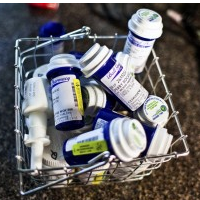Despite Cutbacks, No Big State Prison System Medicates Inmates Like California

Although California prison officials have cut way back on the amount of anti-psychotic drugs it feeds to inmates, the state is still the leader among big corrections systems, according to numbers crunched by the Associated Press.
Some of those numbers came from a report (pdf) in 2012 by the state’s independent Legislative Analyst’s Office, which calculated that California spent $1,500 a year for psychiatric drugs annually on each inmate compared to an average of $610. Other figures were obtained through state Public Records Act requests.
California spent $144.5 million on prison pharmaceuticals in 2012, and about 19% of that money went for anti-psychotic drugs, according to the AP. That’s actually a big drop from 2008 when 34% of all prison prescriptions went for anti-psychotics, and 2009-11 when the figure was 26%. Anti-psychotic drugs are often used to treat schizophrenia and bipolar disorder.
At the same time California prisons were spending 26% of its prison drug money on anti-psychotics, New York was laying out 17%, Texas 6% and Florida 3%, the AP reported.
Almost one-fourth of California’s 133,000 inmates are receiving mental health treatment, a point of contention between state officials and federal courts, which began oversight of the state’s prison medical care in 2005 in response to a lawsuit filed four years earlier. A commissioned study in 2006 by Maxor National Pharmacy Services found, among other things, the “lack of an effective clinical management process to ensure medically-appropriate and cost-effective treatment through use of the drug formulary.”
Despite Maxor’s oddly optimistic report entitled, “An Analysis of the Crisis in the California Prison Pharmacy System Including a Road Map from Despair to Excellence,” the state still seems to be struggling along the path to sobriety.
The federal receiver revamped the California Department of Corrections and Rehabilitation (CDCR) pharmacy operations in 2007, but a study in 2009 found vast amounts of wasted medication in prison pharmacies.
Governor Jerry Brown’s administration has been locked in a struggle with federal judges over continuation of prison oversight by the courts. In January, Brown declared victory, claimed the state prison system was a model for the nation and asked the feds to relinquish control.
So far, they have declined, one reason being 32 inmate suicides in 2012, a 13% increase over the year before.
–Ken Broder
To Learn More:
California Prison Spending: Investigation Reveals Huge Cost of Anti-Psychotics (by Don Thompson, Associated Press)
Governor’s Proposed Budget Augmentation for Inmate Pharmaceuticals (Legislative Analysts Office) (pdf)
Lost Opportunities for Savings within California Prison Pharmacies (Office of the Inspector General) (pdf)
- Top Stories
- Controversies
- Where is the Money Going?
- California and the Nation
- Appointments and Resignations
- Unusual News
- Latest News
- California Forbids U.S. Immigration Agents from Pretending to be Police
- California Lawmakers Urged to Strip “Self-Dealing” Tax Board of Its Duties
- Big Oil’s Grip on California
- Santa Cruz Police See Homeland Security Betrayal in Use of Gang Roundup as Cover for Immigration Raid
- Oil Companies Face Deadline to Stop Polluting California Groundwater





